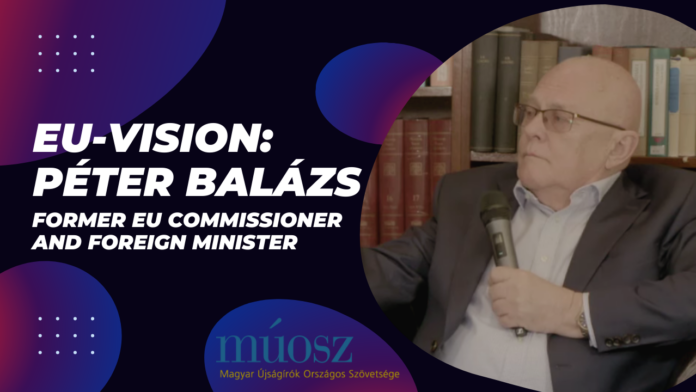In commemoration of Hungary’s 20 years of European Union membership, the National Association of Hungarian Journalists (MÚOSZ) launched an interview series, led by Dull Szabolcs, former editor-in-chief of Telex. The series aims to discuss with experts what Brussels has provided Hungary, the current state of EU politics and institutions, and the future objectives of the union. In the first episode, Balázs Péter, a former EU Commissioner, Foreign Minister in a pre-Orban government, and a professor at Central European University, examined the prospects of EU enlargement. Looking ahead to 2024, he views enlargement as more realistic, noting that “disintegration has often been predicted but has never occurred.
The decision lies with the member states, particularly when and who supports enlargement. He pointed out that the European Union quickly expanded from six to 27 members, with only one exit, while a dozen countries are currently waiting for membership. Reflecting on Hungary’s accession, Balázs remarked, “We were very eager; there was a strong majority in Hungary supporting the accession.” At that time, the EU was also open to enlargement, and some member states even expedited the process. There was no external power opposing it, so the three factors were positive and aligned. He acknowledged the challenges of accession, economic integration, and legal harmonization, which populist, Eurosceptic political forces have exploited. However, he considers this part of the member states’ adaptation process.
Regarding Viktor Orbán’s potential exit strategy, Balázs explained that Orbán dislikes criticism but benefits from EU funds, favorable labor market effects, and the opportunity to play a prominent role on the European stage. Therefore, it is unlikely that he could lead Hungary out of the EU, even if Parliament voted for it, because “it is improbable that public opinion would endorse such a decision. We have grown into the Union so much, with many Hungarians abroad and close ties with the hundreds of thousands working there, and so many of us see the benefits of this that he could not easily push this through.” In the rest of the interview, Balázs Péter analyzes the complexities of EU decision-making, the distribution of competencies, coordination at national and EU levels, and the potential accession of Ukraine and Turkey.

